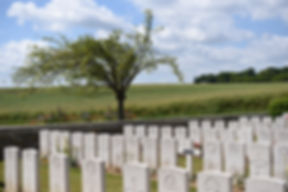



Lewis, Clifford Stanley
Son of William James Lewis, accountant, and Mary Lucy Lewis, of 9 Devonshire Road, Durdham Park. Older brother Edna Margery and Phyllis Mary.
Lewis was born on 01/08/1895, and attended the School from 1905-1914. He served as a Lieutenant in the Army, with the Gloucestershire Regiment 2nd/6th Bn.. Lewis sadly lost his life on 19/09/1916, as a result of the War.
Lewis is buried in Merville Communal Cemetery, France, grave reference VII. A. 28.
Wounded in the Stomach (BGS Chronicle December 1916)
"aged 24, 1905-1914. He left School from the Vith Classical and held the Bristol Scholarship at St. John's College, Oxford. Probably few boys have been more popular in their last year of school, than he, or more deservedly so. One of his last visits to the School was to take part as an umpire in the Field Day at Wrington. He was wounded in the stomach, and survived for a good many days, only to sink when moved on September 18th. He was serving at the time as a Lieutenant in the Gloucesters. He is much mourned, for he added to very considerable ability a simple loveable and unspoiled nature."
"Must learn to catch" (BGS Chronicle December 1913)
FIRST XV CHARACTERS
LEWIS, CS (1913) – “The Catch of the Season” Has improved out of all knowledge. Has any amount of dash, making full use of his height, especially in the line-out, where he has been a tower of strength to the team. Good tackler. Must learn to catch the ball.
Bolt from the Blue OTC Camp 1914 (BGS Chronicle 1914 - C.S. Lewis)
When we entrained for Aldershot at Clifton Down on Monday, July 27th, how little did we think that the War Office, faced with the stern realities of war, would have to put us on one side and that we should be on our way home again three days before our time!
…
The site chosen for the camp at Mytchett Farm, Frimley, was admirable in every respect, the facilities provided for bathing in the lake and for boating on the Canal being especially appreciated.
Our contingent was picked to mount the first battalion guard that night but little of note occurred. It is, indeed, reported that one sentry found the occupants of a certain tent – it was their first night in camp – awake and dressed before 3.30 a.m. the next morning – but never again!
…
A further improvement, too, on previous camps, was the absence of early morning parades (except for short prayers) it having been realised that the old aphorism about the stomach being an army’s mode of locomotion applies most of all to the O.T.C.
…
When we left Bristol the international situation in Europe had been nothing to cause alarm, but about Thursday excitement began to grow tense. We all became politicians and prophets for the nonce and debated on the prospects of war. Rumour soon set to work – “mobilitate viget viresque adquirit eundo.” We were going home next day or Saturday: evidently “the wish was etcetera!” Then we heard that the Portsmouth Grammar School contingent had been recalled to guard the docks. (It subsequently transpired that their instructor was a Reservist and had been ordered to rejoin!)
After this first outburst of excitement things became quieter and by Saturday we all shook our heads wisely and said that camp would not be broken up. We even took little notice of an order issued on Saturday night calling into store all water-proof ground sheets. Rumours grew unheeded during Sunday. On Monday morning fell the bolt from the blue. We were just preparing for a good breakfast about 7.30 a.m. before starting out on the annual big field operations, when the Captain appeared and told us to pack our kits at once and leave the camp by ten. With incredible speed we packed our kits and all the corps property, returned all our bedding and etceteras to store, had breakfast, loaded the motor lorry, marched to North Camp Station, crowded into a “special” awaiting us there and then watched other contingents arrive too late to secure places.
The whole journey was one of suppressed excitement. The S.E. & C.R. would only guarantee our journey as far as Reading. Fortunately when we arrived there, the G.W.R. were able to take us on to Bristol, telegraphing from station to station all down the line to announce our coming. At last we ran into Temple Meads and after considerable altercation with the Railway officials we were shunted out to Clifton Down. At Temple Meads it was rumoured that we were a special garrison for Avonmouth Docks! As we passed through the local stations the sleepy porters stood agape at the unexpected arrival of our long military train of unfamiliar alien coaches. At last about 3 p.m. we reached Clifton Down where we detrained and, marching back to Headquarters after a few words from Captain Lewis were dismissed. Genuine disappointment was felt by all at this sudden termination of the best organised camp we have yet had. We had, however, for some days been living in a state of uncertainty such as we had never known before. Wars and rumours of wars were on all lips and in all ears, and it is certain that on our memories will be graven indelibly “Camp – 1914.”

Clifford Stanley Lewis
Born: 01 August 1895
School dates: 1905 - 1914
Rank: Lieutenant
Regiment: Gloucestershire Regiment 2nd/6th Bn.
Died: 19 September 1916
Age: 21
Remembered: Merville Communal Cemetery, France
Reference: VII. A. 28.
Cemetery Site Map (CWGC)
(Click to zoom)
